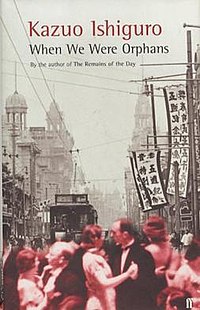 In my head, I kept referring to this book while reading it as "When We Were Young", which it is not. Rather, When We Were Orphans is a novel by Kazuo Ishiguro, who also wrote Never Let You Go (a semi-sci-fi novel much beloved by me) and Remains of the Day (a not at all sci-fi novel much beloved by my mother and Anthony Hopkins). Ishiguro is a great writer, and the synopses of merely these three novels prove he is adept at many genres...no book of his seems the same as the one before it. For those who haven't read them, Never Let You Go follows a group of boarding school kids who are slightly (I won't give away how) different than other boarding school kids, and it definitely is a science fiction, though a gentle, pastoral science fiction. Remains of the Day, as far as I can remember from the movie trailers, is about the relationship between a rich woman and her butler, who really likes dusk. When We Were Orphans bears no resemblence to either book. Rather, it follows Christopher Banks, famous detective, as he lives and explains his path to a life of celebrity and class in London, before he is dragged back into trying to solve the case of his parents' kidnapping/disappearance when he was a child in Shanghai.
In my head, I kept referring to this book while reading it as "When We Were Young", which it is not. Rather, When We Were Orphans is a novel by Kazuo Ishiguro, who also wrote Never Let You Go (a semi-sci-fi novel much beloved by me) and Remains of the Day (a not at all sci-fi novel much beloved by my mother and Anthony Hopkins). Ishiguro is a great writer, and the synopses of merely these three novels prove he is adept at many genres...no book of his seems the same as the one before it. For those who haven't read them, Never Let You Go follows a group of boarding school kids who are slightly (I won't give away how) different than other boarding school kids, and it definitely is a science fiction, though a gentle, pastoral science fiction. Remains of the Day, as far as I can remember from the movie trailers, is about the relationship between a rich woman and her butler, who really likes dusk. When We Were Orphans bears no resemblence to either book. Rather, it follows Christopher Banks, famous detective, as he lives and explains his path to a life of celebrity and class in London, before he is dragged back into trying to solve the case of his parents' kidnapping/disappearance when he was a child in Shanghai.Not to beat the whole genre jumping thing to death, but one of the problems I had with When We Were Orphans is that Ishiguro never seems content with the book being any one thing. The novel is narrated by Banks, via journal entries, which allows him to mix present events (or at least recently past ones) with childhood memories and the events surrounding and following first his father's then his mother's mysterious vanishing. But the book jumps around from Doyle style detective work (less active detecting and more the-great-detective-at-his-leisure) to high society intrigue and chronicle, to a few chapters that are harrowing first person account of the war. All the while, Bank's great detective work is lauded, though you never experience him solving a case; his parent's case is discussed at length but not actually pursued until the closing chapters; and, most frustratingly, all events are seemed to be loosely tied together by the idea that a "great evil force" is taking hold in China, and that only intrepid, virtuous men like Banks can fight it. But this is not a superhero story: neither Banks nor the reader get glimpses of said evil beyond hints, and no active role in fighting it is taken. This seems to imply it is beyond the power of any one man, and maybe the lack of a satisfying conclusion to any or all of the subplots is part of the point. But it felt like many threads of many novels were pushed together into one. Ishiguro is adept at all of them (its not like Ang Lee's Hulk or anything), but it just wasn't a satisfying read. I recommend the writer, but go for Never Let You Go (unless you're my mom. Then read Remains of the Day).
No comments:
Post a Comment